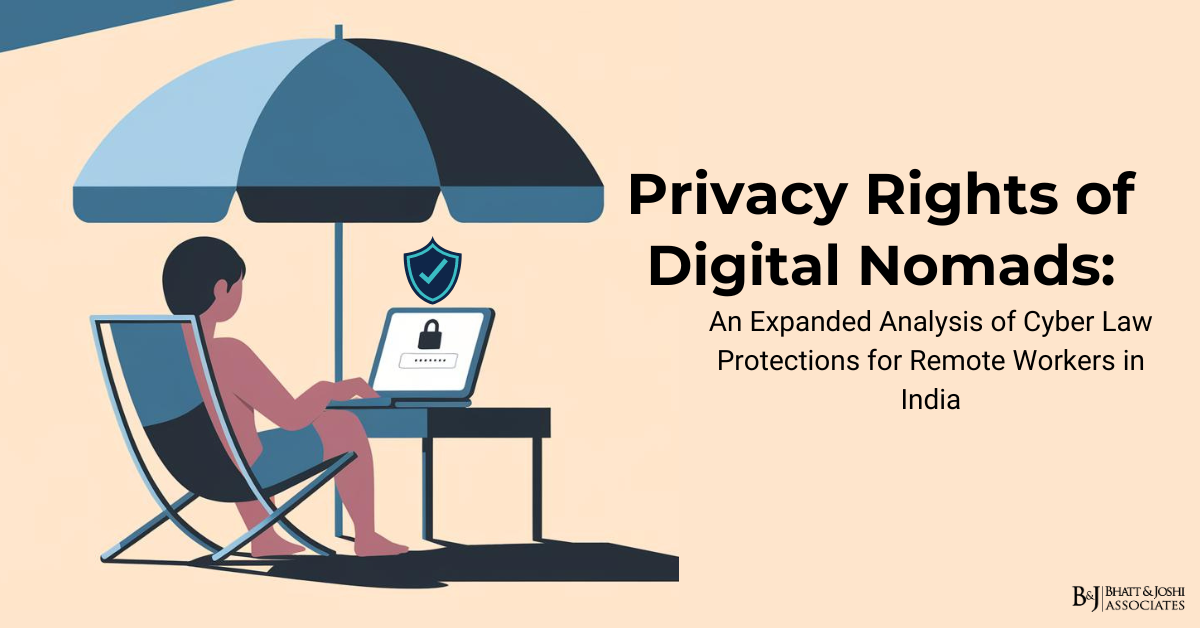Introduction
The rise of digital nomadism represents a profound shift in the modern workforce, driven by technological advancements and the growing acceptance of remote work. Digital nomads—individuals who leverage technology to work remotely while traveling or living in various locations—are becoming a significant demographic in the workforce. This lifestyle offers numerous advantages, including greater work-life balance and the freedom to explore diverse cultures. However, it also introduces substantial privacy challenges. This article provides a comprehensive analysis of the privacy rights of digital nomads in India, examining the current cyber law framework and its effectiveness in safeguarding remote workers’ interests.
The Digital Nomad Lifestyle
Digital nomadism represents a radical departure from traditional office-bound employment. Characterized by its mobility, flexibility, and extensive reliance on digital tools and platforms, this lifestyle enables individuals to work from a variety of locations—cafes, co-working spaces, rented accommodations, or even while traveling. The internet serves as the primary means of connectivity with employers, clients, and businesses.
The freedom and flexibility afforded by this lifestyle come with distinct challenges. The need to frequently connect to different networks, many of which are public or shared, exposes digital nomads to heightened risks such as data breaches, unauthorized surveillance, and cyber-attacks. Additionally, the constant movement and varied working environments add layers of complexity to data privacy and security, requiring both individuals and organizations to adopt comprehensive measures to protect sensitive information.
Privacy Rights of Digital Nomads: Addressing Data Privacy Challenges
Digital nomads encounter several data privacy challenges due to their unique work habits and environments. Public Wi-Fi networks are a common resource for digital nomads, but they often lack robust security measures. Unsecured networks are susceptible to interception by cybercriminals, who can exploit vulnerabilities to access sensitive information. To mitigate these risks, digital nomads should employ Virtual Private Networks (VPNs) to encrypt their internet connections and secure their communications.
The frequent movement of digital nomads increases the risk of device loss or theft. If a device containing sensitive information is lost or stolen, it can lead to significant data breaches. To protect against this risk, digital nomads should use strong passwords, enable encryption, and utilize remote tracking tools to locate lost devices.
Cloud-based storage solutions offer convenience but also pose risks related to data security and privacy. Digital nomads must choose reputable cloud service providers and be aware of their data protection practices. It is essential to understand how data is stored, processed, and protected by cloud services to ensure that it remains secure.
Cyber threats such as phishing attacks, malware, and ransomware are prevalent and can affect digital nomads. Phishing attacks often involve deceptive emails or messages designed to trick individuals into revealing sensitive information. Malware and ransomware can compromise devices and data, leading to significant security breaches. Digital nomads should be vigilant about these threats and adopt robust cybersecurity practices to mitigate risks.
The international nature of digital nomadism introduces complexities related to cross-border data transfers. When data is transferred between countries, it may be subject to different legal standards and regulations. Ensuring compliance with data protection laws in multiple jurisdictions can be challenging, and digital nomads may face difficulties in seeking legal recourse if their data is mishandled.
Cyber Law Framework in India
India’s legal framework for addressing cybersecurity and data privacy is primarily governed by the Information Technology Act, 2000 (IT Act). This Act provides a comprehensive legal foundation for electronic transactions, data protection, and cybersecurity. Several provisions within the IT Act are relevant to the privacy rights of digital nomads.
Section 43A of the IT Act mandates that body corporates handling sensitive personal data must implement reasonable security practices and procedures. This provision aims to safeguard data from breaches and unauthorized access, ensuring that organizations adhere to security standards. It is particularly relevant for organizations that manage data on behalf of digital nomads, such as cloud service providers.
Section 66 criminalizes unauthorized access to computer systems and data, providing legal recourse against individuals or entities involved in hacking or data theft. This section helps protect the integrity and confidentiality of digital information, addressing the risks associated with unauthorized access and cyber-attacks.
Section 66E addresses privacy violations by criminalizing the capture, publication, or transmission of images of private areas without consent. This provision serves to protect individuals from privacy intrusions and unauthorized disclosures, which is particularly relevant for digital nomads who may work in varied and public environments.
Section 72A pertains to the disclosure of information in breach of lawful contracts. It provides a legal framework for addressing unauthorized disclosure of confidential information, ensuring that contractual obligations regarding data confidentiality are enforced. This provision is relevant for digital nomads who may have contractual agreements concerning the handling of sensitive data.
The forthcoming Personal Data Protection Bill, 2019 (PDP Bill) aims to strengthen data privacy protections in India. The Bill introduces several key features designed to enhance data protection for all individuals, including digital nomads.
The PDP Bill requires explicit consent for the processing of personal data. This ensures that individuals have control over their information and are aware of how their data will be used. For digital nomads, this means that they must be informed about data processing practices and provide consent for the collection and handling of their personal data.
The Bill mandates data localization for certain categories of personal data, requiring that it be stored and processed within India. This provision aims to enhance data security and ensure jurisdictional control over personal data. For digital nomads, this means that their data will be subject to Indian data protection standards when processed by Indian entities.
The PDP Bill imposes significant penalties for non-compliance, including fines and compensation for individuals affected by data breaches. This provides a deterrent for organizations that fail to adhere to data protection standards and ensures that individuals have recourse in the event of a data breach.
The Bill grants individuals rights such as access, correction, and deletion of their data. These rights empower digital nomads to manage their personal information effectively and ensure that it is handled in accordance with their preferences and legal protections.
Challenges in Enforcement
Despite the robust legal framework provided by the IT Act and the PDP Bill, several challenges hinder the effective protection of digital nomads’ privacy rights. The international nature of digital nomadism creates jurisdictional complexities that can impede the enforcement of data protection laws. Coordinating actions across multiple jurisdictions with differing legal standards requires substantial international cooperation. Ensuring that organizations comply with data protection laws in various countries can be challenging, particularly when data is transferred across borders.
Technological advancements often outpace the development of legal frameworks. As new technologies emerge, they can introduce new privacy and security risks that existing laws may not fully address. Keeping legal frameworks relevant and effective requires continuous updates and adaptation to emerging technologies and threats.
Digital nomads may lack awareness of their privacy rights and the measures needed to protect their data. Bridging this knowledge gap through educational initiatives is crucial for empowering remote workers to safeguard their information effectively. Providing resources and training on data protection best practices can help digital nomads understand their responsibilities and adopt appropriate security measures.
Technological Measures to Safeguard Privacy Rights of Digital Nomads
Digital nomads can adopt various technological strategies to enhance their data privacy and security. These measures include the use of VPNs, regular software updates, strong password practices, and encryption.
VPNs provide encrypted connections to secure communications over public networks. By masking IP addresses and encrypting data transmissions, VPNs reduce the risk of interception and unauthorized access. Digital nomads should use reputable VPN services to protect their online activities and ensure privacy while working remotely.
Keeping software and operating systems up-to-date is essential for protecting against security vulnerabilities. Regular updates patch known security flaws and enhance the overall security of devices. Digital nomads should ensure that their devices, applications, and security software are regularly updated to mitigate potential risks.
Using strong and unique passwords for different accounts and devices is crucial for preventing unauthorized access. Digital nomads should employ password managers to generate and store complex passwords securely. Additionally, enabling two-factor authentication adds an extra layer of security to accounts and services.
Encryption converts data into a format that is unreadable without the appropriate decryption key. Encrypting sensitive information, both at rest and in transit, helps protect it from unauthorized access. Digital nomads should use encryption tools to secure files, communications, and data stored on their devices.
Organizational Measures for Data Privacy
Organizations that support digital nomads should implement organizational measures to safeguard data privacy and security. These measures include robust data protection policies, secure communication channels, and employee training.
Organizations should establish and enforce data protection policies that outline how personal and sensitive data will be handled. These policies should include guidelines for data collection, storage, processing, and sharing. Digital nomads should be informed about these policies and ensure that their work aligns with organizational standards.
Using secure communication channels for transmitting sensitive information is vital for protecting data privacy. Organizations should employ encrypted messaging and email services to ensure that communications are secure and protected from interception.
Training employees, including digital nomads, on data protection best practices and cybersecurity awareness is essential for maintaining data privacy. Regular training sessions can help remote workers understand potential risks, recognize phishing attempts, and implement effective security measures.
International Comparisons and Best Practices
Examining international data protection law provide valuable insights for improving protections for digital nomads. Several countries have implemented best practices and legal frameworks that can serve as models for enhancing privacy protections.
The General Data Protection Regulation (GDPR) is a comprehensive data protection regulation implemented by the European Union. The GDPR introduces stringent requirements for data processing, including explicit consent, data protection impact assessments, and data breach notifications. The regulation also grants individuals rights such as access, rectification, and erasure of their data. Adopting similar principles can enhance data privacy protections for digital nomads in India.
The California Consumer Privacy Act (CCPA) provides robust privacy protections for individuals in California, including the right to access, delete, and opt-out of the sale of personal data. The CCPA also requires businesses to provide clear notices about data collection practices. Incorporating elements of the CCPA into Indian privacy laws can strengthen protections for digital nomads.
Singapore’s Personal Data Protection Act (PDPA) establishes data protection principles, including the need for consent, purpose limitation, and data accuracy. The PDPA also includes provisions for data breach notifications and enforcement actions. Learning from the PDPA’s approach can inform the development of effective privacy regulations for digital nomads.
Recommendations to Protect Privacy Rights of Digital Nomads
To address the privacy challenges faced by digital nomads, several cybersecurity strategies and recommendations can be made for improving data protection in remote work.
Enhancing legal frameworks is crucial for addressing emerging privacy and cybersecurity challenges. This includes incorporating best practices from international regulations and adapting laws to the needs of digital nomads. Strengthening cross-border data protection agreements and enhancing jurisdictional cooperation can also improve privacy protections.
Increasing awareness and education about data privacy and cybersecurity among digital nomads is essential. Providing resources, training, and guidelines can empower remote workers to protect their information effectively. Educational initiatives should focus on practical measures, such as using VPNs, implementing strong passwords, and recognizing phishing attempts.
Encouraging the development and adoption of advanced security technologies can enhance data protection for digital nomads. Investing in encryption, secure communication tools, and cybersecurity solutions can help mitigate risks and safeguard sensitive information.
Organizations that support digital nomads should implement robust data protection policies and practices. This includes establishing clear guidelines for data handling, using secure communication channels, and providing regular training on data privacy and cybersecurity.
Promoting international collaboration and harmonizing data protection standards can improve privacy protections for digital nomads. Engaging in cross-border agreements and sharing best practices can help address jurisdictional challenges and ensure consistent privacy protections.
Conclusion: Safeguarding Privacy Rights of Digital Nomads
The rise of digital nomadism represents a significant shift in the world of work, offering numerous benefits but also introducing unique privacy and security challenges. Ensuring the privacy and security of digital nomads requires a multifaceted approach that includes strengthening legal frameworks, adopting advanced technological measures, and promoting awareness and education.
As the digital landscape continues to evolve, policymakers, employers, and individuals must work together to address the privacy challenges faced by digital nomads. By enhancing data protection and cybersecurity practices, we can support the growth of this dynamic workforce and ensure that digital nomads can enjoy the benefits of their lifestyle while safeguarding their personal information.
The continued development of robust privacy protections and security measures will be crucial in adapting to the changing nature of work and technology. By addressing these challenges proactively, we can create a safer and more secure environment for digital nomads, allowing them to thrive in their remote work endeavors while maintaining their privacy and security.














